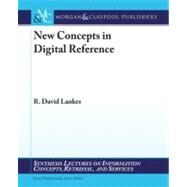New Concepts in Digital Reference
, by Lankes, R. David- ISBN: 9781598297447 | 1598297449
- Cover: Paperback
- Copyright: 3/15/2009
Let us start with a simple scenario: a man asks a woman "how high is Mount Everest?" The woman replies "29,029 feet." Nothing could be simpler. Now let us suppose that rather than standing in a room, or sitting on a bus, the man is at his desk and the woman is 300 miles away with the conversation taking place using e-mail. Still simple? Certainly--it happens every day. So why all the bother about digital (virtual, electronic, chat, etc.) reference?If the man is a pilot flying over Mount Everest, the answer matters. If you are a lawyer going to court, the identity of the woman is very important. Also, if you ever want to find the answer again, how that transaction took place matters a lot.Digital reference is a deceptively simple concept on its face: "the incorporation of human expertise into the information system." This lecture seeks to explore the question of how human expertise is incorporated into a variety of information systems, from libraries, to digital libraries, to information retrieval engines, to knowledge bases. What we learn through this endeavor, begun primarily in the library context, is that the models, methods, standards, and experiments in digital reference have wide applicability. We also catch a glimpse of an unfolding future in which ubiquitous computing makes the identification, interaction, and capture of expertise increasingly important. It is a future that is much more complex than we had anticipated. It is a future in which documents and artifacts are less important than the contexts of their creation and use.







